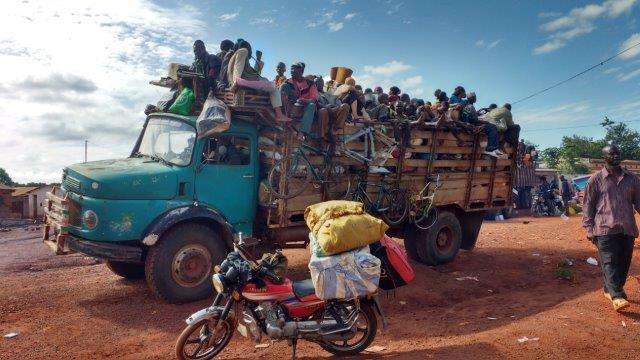Ongoing conflict between self-defense forces and ex-Séléka coalition dissidents led to more violence this week in Bria, a town where Doctors Without Borders/Médecins Sans Frontières (MSF) runs a pediatric program. The Central African Republic Ministry of Health, International Medical Corps, and MSF teams present in the town launched a contingency plan and, between May 15 and May 18, treated 44 casualties in Bria Hospital. An MSF surgical team arrived yesterday to assist the treatment of wounded patients in the hospital's operating theater. Conflict in the east of the country has intensified in recent months, jeopardizing access to health care in many previously stable regions.
Disruption and Displacement
Seeking protection from the fighting in Bria, thousands of the town’s inhabitants have fled. Families have assembled in the Bria hospital compound in the hope that the belligerents will respect its neutrality and protected status. Fifteen thousand people have taken refuge in the PK3 camp for displaced persons, which is now so full it can no longer cope. With the rainy season and resulting cases of malaria at a peak, new arrivals find themselves in extremely precarious living conditions, with very few options for hygiene services and inadequate access to water. MSF teams have increased mobile clinics in the camp so that those who fled can access medical care.
Meanwhile, a vaccination program planned for this week was disrupted by the fighting, depriving 6,000 children under five years old of access to a major preventive health measure.
Indiscriminate Attacks
Places of worship, businesses, and local government buildings associated with one of the warring parties were attacked in the fighting, further inflaming ethnic and religious divides in Bria. Attacks such as these fuel the cycle of reprisals against civilians that has convulsed eastern CAR for months.
In the town of Bangassou, the situation has calmed yet remains volatile following violence last weekend. Some 7,000 people are still displaced in the local church compound. MSF has restarted routine activities at the hospital to meet the needs of a large caseload of patients, many of whom have severe medical conditions, most notably due to malaria. MSF teams also run mobile clinics in the area for people displaced by the violence. About 250 patients received treatment during recent mobile clinics and 250 were treated at the hospital from May 16 to May 18.
Last week, clashes in Alindao caused displacement of the population towards Bambari. MSF team in the Bambari hospital treated six people wounded in the fighting. Another team is on its way to evaluate the needs of displaced people in and around Alindao, as well as in Mobaye.




